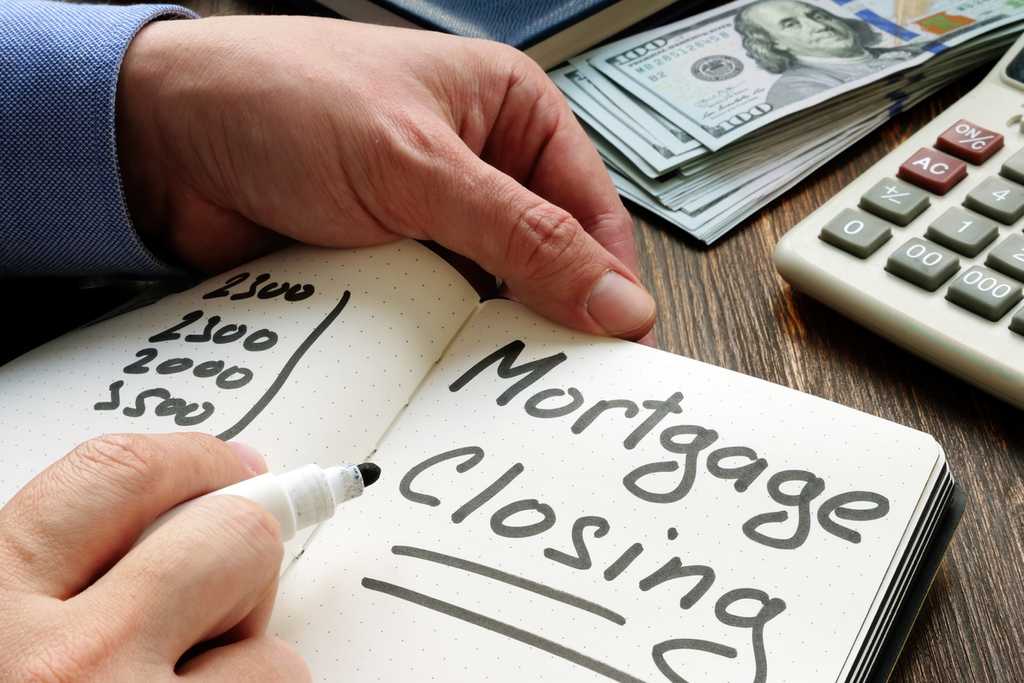When I walked into what would be my home for the first time I had a complete rush of energy. All I could think about were the beautiful countertops, the new flooring, and how nice it would be to finally have a second bathroom. In the midst of envisioning white linen curtains and my future children running around the large carpeted rooms, the huge home loan seemed to slip my mind. And I surely wasn’t thinking about the mortgage closing costs I’d have to pay to finalize that loan.
It wasn’t until I started receiving lengthy documents and seeing dollar signs that I began thinking about the costs beyond the down payment and interest rates. Looking back, I wish I’d done more research on the fees I was being charged rather than which sofa would look best in our new living room.
I know I’m not alone, and it can be especially difficult to keep a budget in a housing market where houses are going within minutes of being on the market. If you’re in the process of buying a home it can be tempting to throw your hands up once the contract is signed and pay whatever they ask. But taking a little extra time to familiarize yourself with mortgage closing costs could save you hundreds, sometimes thousands, of dollars.
What Are Closing Costs?
Closing costs are the fees that borrowers pay to finalize a home mortgage loan. They include both lender fees and third-party fees and vary depending on your state, loan type, and mortgage lender. Closing costs are included in, but not the same as, cash to close and don’t include your down payment or any earnest money you put down.
Even people paying cash for a home or receiving real estate as a gift can be subject to some closing costs. Thankfully you have some time to save for them as closing costs typically aren’t due until your closing meeting. At that time your lender will collect both your closing costs and down payment funds.
Your lender is required by law to give you a loan estimate, detailing your estimated closing costs, within three business days after applying for a loan and a Closing Disclosure, detailing the final loan terms and costs, at least three business days before you close on the mortgage loan.
It’s important to look through the document to make sure you understand everything you're being charged for so you know if anything is worth negotiating.
Who Pays Closing Costs at Closing?
Most of the closing costs fall on the buyer of a property, but the seller may have some to pay as well. In fact, sellers pay fewer closing expenses, but may actually pay more at closing. Generally, sellers pay real estate commissions to both the buyers’ and the sellers’ agents which usually amounts to 6% of total purchase price or 3% to each agent.
Additionally, buyers can negotiate for sellers to pay for low-cost closing fees like the buyers’ title insurance policy. They may also have to pay the buyer for property taxes and HOA fees if they haven’t already been paid for the year.
How Much Are Closing Costs on a House?
Closing costs on a home can run anywhere from 1% to 6% of the home's value. The national average including taxes is 1.69%.
In 2020, national average closing costs for a new mortgage on a single-family property were $6,087 including taxes, and $3,470 excluding taxes. These were 5.9% and 3.9% increases, respectively, over 2019. The District of Columbia had the highest average closing costs with $29,329 including taxes and $6,250 without taxes.
You’ll pay closing costs if you decide to refinance as well. The national average closing costs for a single-family residential property refinance in 2020 were $3,398 including taxes or 1.22% of the loan amount.
Types of Fees
Closing costs are made up of a number of lender fees and third-party fees. There are far fewer lender fees than third- party and even though the list is long, not every fee applies to every loan.
Types of lender fees
Lender fees include all the items the lender utilizes in order to process, approve, and fund your home mortgage loan.
Loan application fee: Covers the cost of processing your request for a new loan and includes costs such as credit checks and administrative expenses.
Prepaid interest: The interest that accrues on the mortgage between the date of settlement and the first monthly payment due date.
Mortgage Points to reduce the interest rate: Paying upfront to reduce the interest rate you pay over the life of your loan. The cost of one point equals 1% of the loan amount.
Origination fee or loan fee: A charge by the lender for preparing your mortgage loan. This can cover document preparation, notary fees and the lender’s attorney fees. Also known as an underwriting fee, administrative fee, or processing fee. Expect to pay about 0.5% of the loan amount.
Underwriting fee: The cost to have someone look at your application and determine if you qualify for the loan.
Broker fee: A commission charged by your mortgage broker as a percentage of the loan amount. The commission averages from 0.5% to 2.75% of the home’s purchase price.
Mortgage insurance: A charge for Private Mortgage Insurance (PMI) if your down payment is less than 20% of the home’s value or fees for determining if you need certain types of hazard insurance.
Types of third-party fees
Third-party fees involve items related to the act of processing and protecting your mortgage loan.
VA funding fee or USDA guarantee fee: Upfront guarantee paid to the VA or USDA, respectively, to guarantee the loan. The USDA loan upfront guarantee fee is 1% and the VA loan guarantee fees range from 1.25% to 3.3% of the loan amount, depending on the size of your down payment.
FHA up-front premium: An upfront mortgage insurance premium payment of 1.75% of the loan amount if your mortgage is insured by the Federal Housing Administration.
Title search: Conducted to ensure that the person selling the house actually owns it and that there are no outstanding claims or liens against the property. Title search fees average around $200.
Lender's title insurance: Charge for insurance policy to protect the lender in case there’s an error in the title search and someone makes a claim of ownership on the property after it’s sold.
Borrower's title insurance: A policy to protect yourself in case title problems or claims are made on your home after closing. Cost is about 0.5% to 1% of the purchase price.
Appraisal fee: Cost to have the value of the home appraised by a professional. The average cost of a home appraisal by a certified professional appraiser ranges from $300 to $400.
Home inspection: Cost to have the home inspected for structural soundness. The average cost of a home inspection ranges from $300 to $500.
The fees don’t stop there. Other various third-party fees include:
- Flood hazard determination fee
- Credit check fee
- Settlement or escrow agent fee
- Attorney fee (in states where borrowers need a real estate attorney)
- Deed recording fee
- Property transfer tax
- Courier fee
- Wire transfer fee
- Condo certification fee
- Homeowners association certification fee
- Loan document preparation fees
- Prepaid homeowners insurance
- Escrow reserves
- Prepaid property taxes
- Prepaid flood insurance
- Notary fees
Be sure to thoroughly inspect your loan estimate and compare it to your Closing Disclosure so you fully understand the costs and any discrepancies. Just because you’re committed to buying the home doesn’t mean you have to pay every fee on the disclosure. You can negotiate anything on either document.
Frequently Asked Questions (FAQ)
For most people, It’s not everyday you buy a home. So there are, understandably, many questions about mortgage closing costs. Especially when it comes down to actually paying them.
How can I avoid closing costs?
There are many people involved in the process of creating and finalizing a mortgage loan so closing costs are inevitable. Some lenders will advertise that they’ll pay closing costs, charge a flat fee for closing costs, or offer some kind of rebate.
While you may think you’re saving money on closing costs these lenders often charge fees elsewhere to make up the loss in commission. That’s why it’s so important to shop around for lenders before you start touring houses.
In the myriad of necessary fees you may also find "junk fees" or "garbage fees" and, while they can’t be avoided altogether, they can oftentimes be minimized. If you’re purchasing a home, watch out for excessive fees in these categories:
- Application fee: Typically anywhere from $0 to $500
- Underwriting fee: Typically anywhere from $400 to $900
- Mortgage rate lock fee: Typically, short-term rate locks (those less than 60 days) are free
- Loan processing fee: typically between 0.5% and 1% of the total loan amount
Just the act of questioning a fee can often result in the fee being lowered or even eliminated altogether. By shopping around for lenders you can compare offers and see what fees other institutions are (and aren’t) charging to make negotiating easier.
You can get loan estimates from multiple lenders. A loan estimate is valid for 10 business days and will typically run you $30 or less, which covers the fee for pulling your credit report.
What if I can't afford closing costs?
When saving for a home it’s important to factor closing costs into your budget. You can shop around for lenders to find the best deal even before you start looking for homes. And when you get your loan estimate and Closing Disclosure documents, negotiate some fees to lower your closing costs.
Some states, counties, and cities offer low-interest loan programs and/or grant programs to help first-time home buyers with closing costs. You may also want to consider working a side hustle to stash up extra cash.
Can closing costs be included in the loan?
If you’re getting closer to your closing date and you simply don’t see yourself being able to afford the estimated closing costs you may be able to finance them by folding them into the loan. The downside to that is you’ll end up paying interest on those costs through the life of the mortgage. For a $300,000 mortgage, rolling $5,000 in closing costs into your loan could cost you an extra $1,000.
If your lender doesn’t allow you to roll closing costs into the loan directly then you may be able to negotiate for the seller to pay closing costs in exchange for increasing the sale price of the house by the amount of the closing costs.
Closing Costs Aren’t Evil But They Shouldn’t be Exorbitant
While it doesn’t seem like it, closing costs cover the expenses that are important to making sure you’re getting a loan and a home that’s a good financial fit for you. That said, you should always try to negotiate with them to be sure you’re getting the best deal and not paying for things you don’t need.
Don’t let the excitement of your new home distract you from what a huge financial decision it is. This is a case where a little research can go a long way in saving you money.

